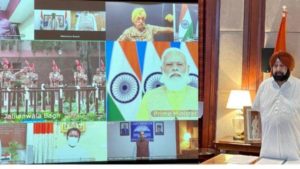
Prime Minister Narendra Modi said on Saturday that it is every country’s duty to protect its history as events of the past “teach us and give us direction to move forward”. While virtually inaugurating the Jallianwala Bagh memorial complex and paying homage to the martyrs, PM Modi said, “The global developments remind us of the importance of self-reliance and self-confidence. At a time when we are celebrating Amrut Mahotsav, we should strengthen our nation’s foundation and take pride in it.”
A wreath-laying ceremony was held and a two-minute silence was observed in the memory of martyrs of the 1919 Jallianwala massacre.
“Today, if any Indian is in trouble anywhere in the world, then India stands up to help him with all its might. Be it the Corona period or the crisis in Afghanistan, the world has experienced it continuously. Hundreds of people from Afghanistan are being brought to India under Operation Devi Shakti,” PM Modi said while dedicating the memorial to the nation.
Join me as we inaugurate the renovated complex of Jallianwala Bagh Smarak today at 6:25 PM. I also invite you to watch the sound and light show. It would display the horrific massacre of April 1919 and instil a spirit of gratitude and reverence towards the martyrs. pic.twitter.com/p2BDHUbXAJ
— Narendra Modi (@narendramodi) August 28, 2021
The event was also attended by Punjab Chief Minister Amarinder Singh, several union ministers, Jallianwala Bagh trustees and several MPs and MLAs. Families of the Jallianwala massacre martyrs were also present.
Asserting that the dedication of the renovated complex in the country’s 75th year of freedom is a matter of inspiration for all, PM Modi said, “Horrors like the Jallianwala Bagh massacre and the partition speak of the sacrifices made for India’s freedom and should not be forgotten as they inspire to keep the country above all. It is not right for any country to ignore such horrors of its past.”
Museum galleries have been developed at the memorial and the event showcased multiple development initiatives taken by the government to upgrade the complex.
Noting that August 14 is now being observed as Partition Horrors Remembrance Day, the prime minister said, “This place will inspire future generations about the journey of our Independence movement, the sacrifices and countless struggles of our ancestors.”
Quoting Gurbani, PM Modi said happiness emanates from empathy and service. “We will have to work together for the progress of Punjab and the country in every sphere. Gurbani teaches us that happiness comes by serving others,” he said, adding “virasat (heritage) and vikaas (development) must coexist”.
ABOUT THE MEMORIAL COMPLEX
Four museum galleries have been established through adaptive reuse of redundant and underutilised buildings.
They showcase the historical value of events that unfolded in Punjab during that period, with the fusion of audio-visual technology, including projection mapping and 3D representation, as well as art and sculptural installations.
In an oblique reference to the ongoing agitation of the peacefully protesting farmers, Chief Minister Captain Amarinder Singh said the Jallianwala Bagh Smarak recently dedicated to the people by the state government, should serve to remind our leaders of the inalienable right of Indians to conduct peaceful democratic protests, which could not be stifled, as the British also learnt from the Jallianwala Bagh incident.
“The Smarak established by the state government ” seeks to pay tribute to the great martyrs so that history may always remember their sacrifice and our present and future generations can draw inspiration from their patriotism,” the chief minister said.
Amarinder Singh also requested PM Modi that the Central government should use its good offices to bring back the personal effects, including the pistol and personal diary of Shaheed Udham Singh, who avenged the injustice of this massacre, from the United Kingdom to India.
He said he had already written to External Affairs Minister Dr. Jaishankar in this regard.
WHAT IS THE JALLIANBAGH MASSACRE ABOUT?
For the unversed, on the fateful day of Baisakhi on April 13, 1919, the British forces had fired indiscriminately on a large and peaceful gathering of protesters, killing over 1,000 people and wounding hundreds of them.
Recalling that the story of this sacred monument started in the aftermath of the tragedy, when a resolution was passed in 1920 to build a memorial at the site and subsequently, land was purchased by the trustees, the chief minister said that in 1951, soon after India gained independence, the government declared it as a “memorial of national importance”.
On August 14, the state government also dedicated a Jallianwala Bagh Centenary Memorial park at a separate location in Amritsar, as a tribute to the great martyrs, Amarinder Singh said.
The said memorial bears the names of all 488 martyrs available as per records, Amarinder Singh said, adding that his government had also constituted a special research team of Guru Nanak Dev University, Amritsar, to identify any missing names of martyrs that need to be inscribed on this memorial, for which sufficient space has been left.




 Driving Naari Programme launched in Chandigarh
Driving Naari Programme launched in Chandigarh






























